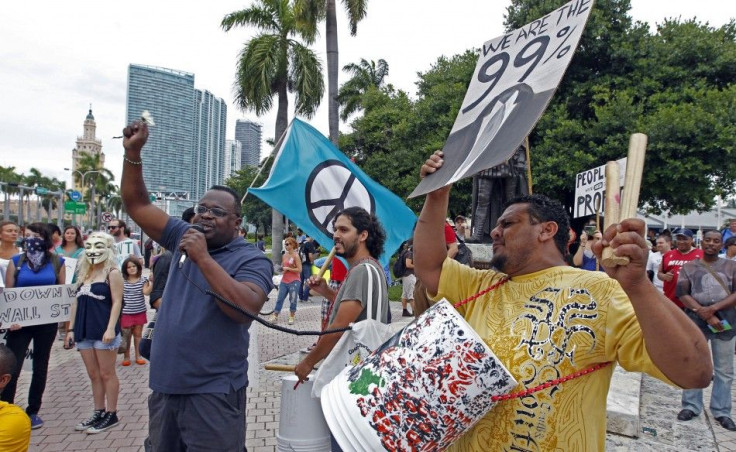Occupy Miami, Police Poised for Sunset Standoff After County Orders Eviction

Miami-Dade County, Fla., has issued an order to vacate to Occupy Miami activists, warning protesters they would face arrest if they do not leave their longtime Peace City encampment in downtown Miami by sunset Tuesday.
After spending more than three months on the west lawn of the Stephen P. Clark Government Center, Occupy Miami, which has largely avoided the conflicts with police that came to define other Occupy groups across the country, is finally facing the same fate as their bigger-name counterparts: eviction. A memo from Miami-Dade authorities dated Monday advises those affiliated with the movement to remove themselves and all of their personal property by Tuesday evening or be subject to arrest.
While the memo does not specify the reason for eviction, the group said the notice came three days after the building management denied them a permit to occupy the space on grounds of current site conditions and unsafe activities. Up to this point, the activists had been able to renew their permit on a weekly basis, according to Bruce Wayne, a member of the Occupy Miami media group.
The building management had been very accommodating, considering how unusual these circumstances are. Then, one day, we were given an eviction notice, Wayne said.
In a statement to the Miami New Times, county spokeswoman Suzy Trutie said the Occupiers are being evicted for unsanitary site conditions and unsafe activities. Those were the reasons attributed to similar Occupy evictions in New York City and Oakland, perhaps the most visible groups associated with the movement.
However, Occupy Miami has been a notably peaceful presence compared with some of the other groups across the nation. Wayne said the group's largest-scale arrest came on Jan. 12 after police detained seven non-violent protesters participating in a vigil on the Florida International University campus.
Occupy Miami believes the eviction may be linked to a Jan. 5 memo sent to Mayor Carlos Gimenez urging him to exercise his authority to remove the protesters from their encampment. In the memo, which was provided to the International Business Times, County Commissioner Joe Martinez wrote that while he believe the right to free speech is sacred, what may have started as a free speech exercise has turned into a Tent City without a visible purpose or end.
Wayne suggested the eviction could be politically motivated, noting that Martinez is actually challenging Gimenez in November's mayoral election.
If [Gimenez] didn't take action, Martinez could use that against him in the election by saying things along the lines of 'Oh, look he wouldn't even crack down on that homeless camp, Wayne said.
While organizers expect some of the Occupiers to fight the eviction, there is no systematic resistance planned. The future of the movement is also unclear, although Wayne emphasized the end of Peace City does not signal the end of Occupy Miami.
Some people might obsess over the fate of a patch of land. But, the conditions that led to the occupy movement -- like income inequality, healthcare access and the cost of education -- have not changed, which is why the movement isn't going away.
© Copyright IBTimes 2025. All rights reserved.





















